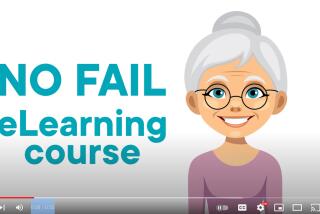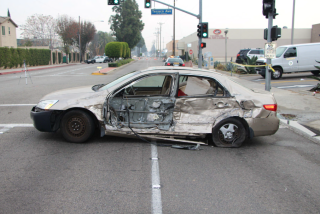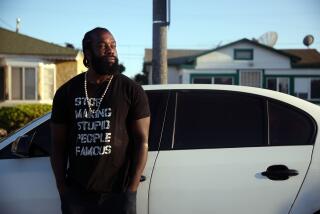For Some, Traffic School Can Be Just One Big Joke : * Consumers: The courses are a $30-million-a-year business. They use several approaches, including hiring comics for instructors and offering cooking lessons, to attract customers.
- Share via
When comedian-actor Ron Green moved from Seattle to California nine years ago, he received three traffic tickets during the first month--two of them in one week.
He also got a stern warning letter from the Department of Motor Vehicles: One more moving violation that year and he’d lose his driver’s license.
Just the thought of trying to get around Los Angeles by bus made him clean up his act. “It forced me to become the most aware driver on the planet,” says the 40-year-old Green. “I haven’t had a ticket in over six years.”
And for the past four years, he has preached what he practices.
As an instructor at the World Famous Improvisation Traffic School, Green teaches others about defensive driving, road signs and rules, basic safety concepts and the finer points of the state Vehicle Code.
“We do the instruction with comedy, but we try to sneak in learning about the laws,” he says.
The Improv is just one of about 450 traffic violator schools conducted at some 3,100 locations statewide. Many take a comedic approach to the curriculum, while some cater to singles or gays. Others offer free pizza or gourmet cooking lessons.
Such schools generate big business in California--about $30 million last year. Every day except Sundays and holidays, 4,000 people attend them; about 1.2 million of the state’s 19.5 million drivers took a traffic school course last year.
Although the schools have operated in California since the 1950s, the DMV has licensed them only since 1985. The state agency regulates and inspects the courses, and tests and licenses instructors. Schools must file a $2,000 bond, teach sessions of at least 400 minutes, provide suitable classrooms and follow a certain curriculum.
DMV field office investigators inspect classes on a random basis or after a student complaint, says J. J. Carlson, of the DMV in Sacramento.
“We get about 15 to 20 complaints a week. People complain about the curriculum content, or say the instructor wasn’t funny or his jokes were inappropriate. The more serious complaints are about the instructor letting the class out early or that there wasn’t any educational benefit from the class,” Carlson says.
Minor school violations--such as not sticking to the proper curriculum--can result in warning letters or probation, he says, while more serious offenses--such as shortening classes or selling certificates to students without classroom instruction--may lead to license suspension.
Some traffic judges have complained about the comic names for schools “because they think they’re not traffic-oriented,” Carlson says. “But we don’t get too many complaints from judges about (instruction at) the schools. We’d like to get more.”
While DMV has no way to rate the schools, he says, the agency and the Automobile Club of Southern California will soon begin a study in Los Angeles to determine how to improve traffic school programs and make them more effective.
Comedy courses are the most popular. Although all the courses are time-consuming, says Mark Cox, a Pepperdine University student attending one of Green’s classes, “it’s better to have a little humor while you’re learning.”
The comedic approach is credited to Ray and Linda Regan, who founded Lettuce Amuse U Comedy Schools in 1985 and who also run Comedians Plus schools. The Regans operated two successful traffic schools in Chicago before moving to the Los Angeles area in 1980.
“From teaching traffic schools in Chicago, they found that police officers with sense of humor had a better response (from students),” says Lettuce Amuse U instructor Shea DoQui. “Here, they decided it was easier to hire professional comedians as instructors and teach them driving and safety.”
California drivers who have not been cited for a moving violation--such as speeding, failing to make a complete stop at a stop sign (called a California roll) or running a red light--in the past 18 months usually can attend a traffic school to keep the one-point ticket off their driving records. (The time period was extended from 12 months to 18 months last year.)
But not all state drivers have such an option; it depends on the judicial district in which a driver has been cited.
“The judges have the right to decide,” says Frank Ketchel of the DMV. “In most of the big population centers--Los Angeles, Orange County, San Diego--drivers can go to traffic school. But some judicial districts don’t permit it. For example, you can’t go to traffic school in the county of Sacramento. The courts there don’t like traffic school or (don’t) think it’s a benefit to them.”
And no driver can attend traffic school if he has a two-point misdemeanor ticket for drunk or reckless driving, exhibition of speed (drag racing) or driving with a suspended license.
Prices for the private traffic courses range from $16 to $35. The driver must also pay a court fee of about $24. A course may be taken in one, eight-hour daytime class or two, four-hour evening sessions.
After completing the course, the driver receives a signed certificate from the instructor; the certificate must be presented to the court. The court then advises the DMV that the driver has attended traffic school and the citation is dismissed, says Ketchel. The record is not open to public view nor insurance company scrutiny.
If a driver gets a one-point violation and doesn’t attend traffic school, the point remains on his or her driving record for 36 months; a two-point violation stays there for seven years.
Most violations will be picked up by insurers, and the driver’s premium probably will be raised “significantly,” say insurance experts.
A driver who gets four points on his record in a 12-month period is placed on one year’s probation and has his license suspended for six months. A driver facing suspension has the right to a hearing at a DMV Driver Safety Office. There is at least one hearing office in every county, and several in large, populous counties such as Los Angeles.
Ketchel also warns repeat offenders against attempting to cheat the traffic school system:
“If they get another ticket in a different court, they tell the court ‘No, I haven’t been to traffic school in 18 months,’ and if the court hasn’t looked up their record, then they go to traffic school.
“But the DMV computer can catch them. It is not going to disguise a ticket from your record.”
More to Read
Sign up for Essential California
The most important California stories and recommendations in your inbox every morning.
You may occasionally receive promotional content from the Los Angeles Times.













